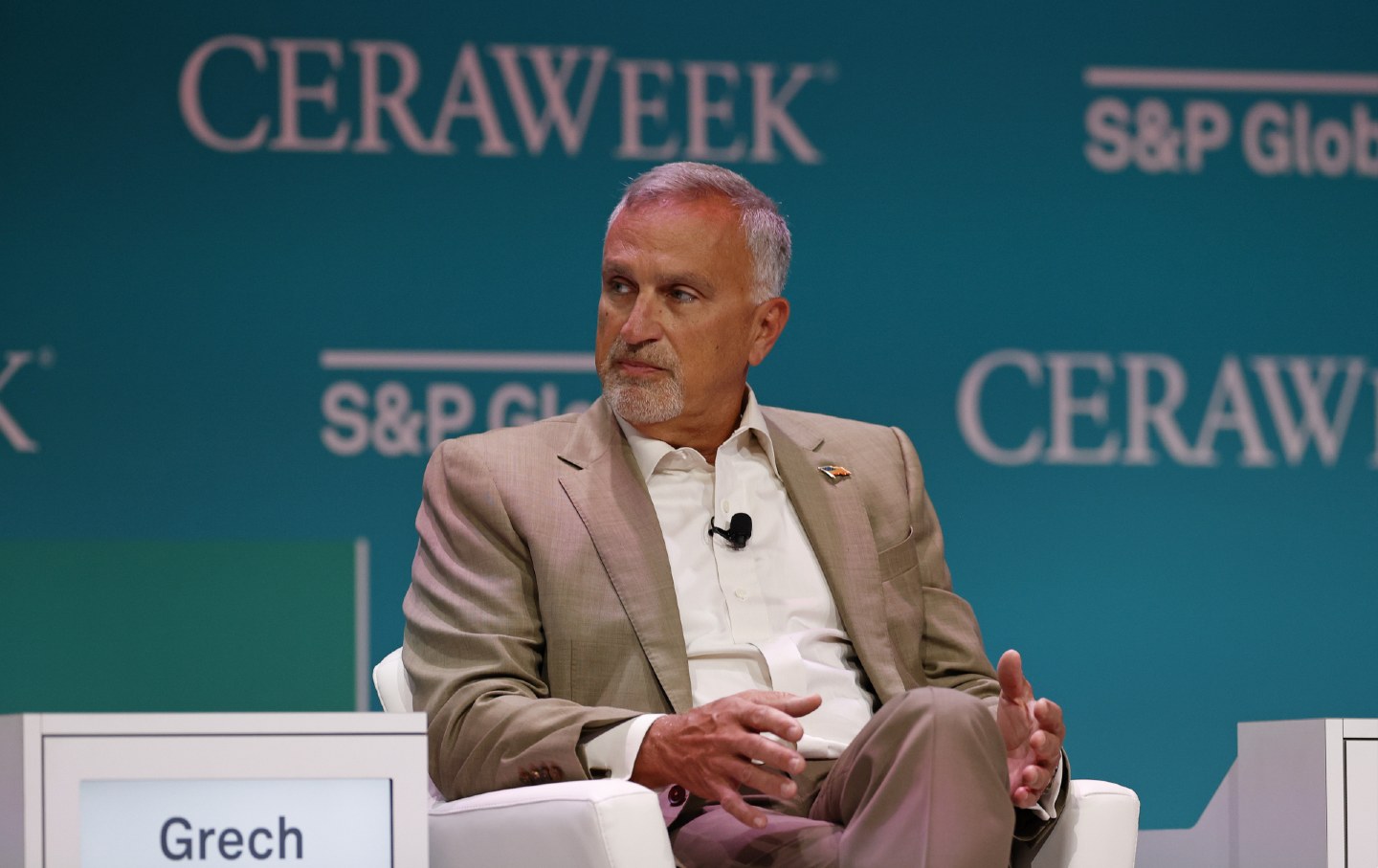Meet the “Coal-igarch” Jim Grech, CEO of Peabody Energy

September 5, 2025 - On Friday evening May 23, officials at the Michigan-based utility Consumers Energy received an unusual order. Trump’s Department of Energy, citing a “national energy emergency,” ordered the J.H. Campbell coal plant on the shores of Lake Michigan, slated for June 1 closure, to remain open.
“What was surprising about this order is that nobody was asking for it,” said Dan Scripps, chair of the Michigan Public Service Commission, in an interview with The New York Times. Neither the utility nor the state requested this, and Michigan energy officials estimate that the additional cost to consumers of keeping the 63-year-old plant open will be $279 million annually.
On August 21, the Trump administration extended the order for an additional 90 days, the statutory maximum for such an emergency. These actions are an extraordinary and unprecedented federal intervention in state-level utility regulation—and a Trump era payback to the fossil fuel oligarchs who helped get him elected.

Jim Grech, president and chief executive officer of Peabody Energy Corp, speaks during the 2023 CERAWeek by S&P Global conference in Houston, Texas, on Thursday, March 9, 2023.
Photo: Aaron M. Sprecher, Getty Images
How is it possible that zombie coal plants, costly and polluting dinosaurs of a bygone era, could be resurrected for a second life? Only with the interventions of “coal-igarchs” like Jim Grech, CEO of Peabody Energy, can these energy relics remain. Peabody, formerly Peabody Coal, is a mining conglomerate, founded in 1883. It is a leading coal producer, operating 17 surface and underground mines and with 5,000 employees across the United States and Australia.
Yes, that Peabody. Singer John Prine, in his famous song, “Paradise,” recounts returning to western Kentucky to visit the mountain town where his father was raised, only to find a ghost town: “I’m sorry my son, but you’re too late in asking. Mr. Peabody’s coal train has hauled it away.”
Coal burning in the US has been in steady decline for decades because of its rising cost and its status as the most polluting form of all fossil fuels, accounting for roughly 40 percent of the planet’s carbon dioxide emissions, according to the Global Carbon Project. In 2000, half of US energy came from coal. By 2023, coal’s share had shrunk to 16.2 percent, replaced by less expensive gas, solar, wind, and other renewables. Since 2000, 780 coal-generating units have been shuttered and half the remaining 400 facilities are scheduled for retirement, according to Global Energy Monitor.
In true oligarch fashion, Grech has used his position, power, and wealth to lead efforts to elect Trump, appoint fossil fuel–friendly administrators, and implement their long-sought program of dismantling climate protections while ginning up coal consumption for a few more years. The Climate Accountability Research Project listed Grech as a 2024 “Climate Criminal” for his role in “running out the clock” for timely climate action and as an “enemy of the earth.” And that was before Grech’s intervened in federal policy this year.
Grech is a happy warrior for coal, traveling by corporate jet from his home in Miromar Lakes, Florida to company headquarters in St. Louis and Brisbane, and to DC to counter the anti-coal “negative publicity campaign.” In a late-June interview for energy investors, Grech effused, “It’s safer to work in a US coal mine than to work in a shopping mall or supermarket” and that “the world is turning towards coal not away…. We are the solution to the energy needs of the world and we aren’t the problem.” Citing the increasing demand for AI data centers, Grech says coal is superior to “weather dependent energy.”
As a leader of Americas Power, a pro-coal lobbying group, Grech advanced the idea that coal plants should be kept open because of a national energy emergency, even though coal remains the worst polluting and most expensive energy source. Just like manufacturing a crime wave to justify federal military intervention into US cities, Trump energy officials have hyped the risk of summer power outages in the Midwest to justify emergency pronouncements.
Grech has a “coal-centric” worldview and political agenda. In an interview on Veritan, Grech states repeatedly that, “putting aside the carbon issue,” coal is the answer to the world’s hunger for electricity. This is despite many US states and European nations’ transitioning away from coal with cooperation from state regulators and consent decrees with organizations like the Sierra Club.
The US has tremendous coal reserves, Grech opines, with Peabody’s North Antelope Rochelle Mine in Wyoming, which mined 60 million tons of coal in 2024 and holds 1.3 billion tons of “proven and probable reserves.” But domestic markets are limited by strong anti-coal environmental legislation and utilities shifting to renewables. And export to Asian markets, including India and China, is thwarted by the absence of West Coast ports. If the coal oligarchs get their way, watch for federal action to override the opposition from California, Oregon, and Washington to coal-export terminals.
Grech and fossil fuel industry players raised millions for Trump’s reelection campaign. At an April 2024 meeting on energy policy at Mar-a-Lago, Trump raised millions from fossil fuel industry players through a boldly transactional request for up $1 billion for his campaign. He pledged to scrap Biden-era regulations and said, according to attendees, that giving $1 billion would be a “deal” in terms of the taxes and regulations they would avoid thanks to him. Grech and Peabody’s PACs gave over $100,000 to Trump and a handful of coal-friendly congressional Republicans.
On January 20, Inauguration Day, Trump signed an executive order “Declaring a National Energy Emergency,” directing federal agencies to speed up energy projects such coal mining and drilling for oil and gas. Trump immediately nominated a cadre of fossil fuel industry boosters in key positions, including oil services company executive Chris Wright as secretary of energy, who appointed Alex Fitzsimmons to the Office of Cybersecurity, Energy Security, and Emergency Response. Fitzsimmons, a Grech ally who had worked for several Peabody-funded organizations, worked on advocacy efforts to roll back the Clean Power Act.
Grech was present at the White House on April 8 when Trump signed an executive order, “Reinvigorating America’s Beautiful Clean Coal Industry,” that prevented closure of coal plants under the Federal Power Act and lifted a moratorium on drilling and mining on federal lands. Six days later, Peabody announced the signing of seven-year contract with Associated Electric Cooperative to provide 7 to 8 million tons of coal per year to Midwestern coal-generating stations. The value and terms of the contract are not public, but its estimated value is, at minimum, over $5 billion, not including the cost of transporting the coal from Wyoming to Midwest utilities.
The DOE’s Fitzsimmons issued the May 23 order to keep the J.H. Campbell power plant open, citing “national security considerations.” A leaked DOE memo revealed that Fitzsimmons fully understood the practical and financial challenges of closing the plant but pressed ahead.
The J.H. Campbell coal plant scrambled to comply with the Trump administration’s order. After allowing the plant’s coal reserves to dwindle, in anticipation of the June 1 closure, Consumers Energy worked to keep retiring staff on board and locate the 15,000 tons of coal per day the plant needs to operate. A spokesperson from Consumer Energy told me they are sourcing it from Wyoming’s Powder River Basin on an ongoing basis to comply with the order, but declined to disclose which with company. Peabody Energy remains one of the largest mining operators in the PRB.
In Michigan, protesters took to the streets to protest keeping the Campbell plant open. At an August 15 demonstration at the office of US Representative Bill Huizenga, environmental activist Indigo Umlor told the Michigan Advance that Huizenga “has chosen to align with MAGA politicians and align with keeping this plant open for longer. This plant is costing about $1 million a day to stay open, and in the last five weeks has cost taxpayers about $30 million.”
Grech and his pals love Trump’s executive orders and deregulation moves, but must, in Grech’s words, “make it stick through legislation.”
In addition to politicians like Huizenga, we need to know the names the oligarchs, like Jim Grech, who are often the invisible powers behind the coal-gilded throne.

